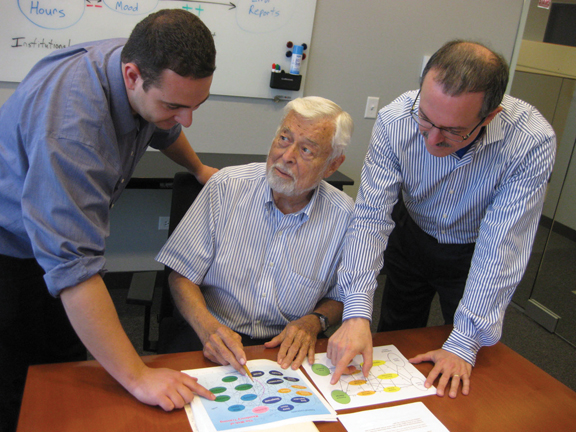A Humanist in Medicine
More than a half-century of research and progress and DeWitt Baldwin ’43 still has more to do.

Baldwin, center, confers with members of his research team on a structural equation model of the resident working-and-learning environment.
“I doubt if anyone in my class or on the faculty at Swarthmore would have ever predicted an academic career for me,” says DeWitt “Bud” Baldwin. Yet the work of the pediatrician, family practitioner, and psychiatrist turned medical professor and researcher has garnered him two honorary doctoral degrees and numerous national and international awards for his pioneering and innovative work in medical and interprofessional education and healthcare.
Now in his 90th year, Baldwin still works full time as scholar-in-residence at the Accreditation Council for Graduate Medical Education in Chicago, conducting research on the experience of residents in training and what makes a good physician. “Becoming a physician is not just about good scientific and clinical training,” says Baldwin. “It’s also about developing fully as human beings and professionals.”
He is also a professor emeritus of psychiatry and the behavioral sciences at the University of Nevada School of Medicine and an adjunct professor of clinical psychiatry at Northwestern University School of Medicine.
In addition to having served as president of Earlham College, Baldwin has held professorial positions in eight schools of medicine and helped found new medical schools at the universities of Nevada and Connecticut.
During a career spanning nearly 60 years, Baldwin has remained dedicated to improving how health professionals are trained and how healthcare is delivered to patients, believing that “As teacher is to student, physician will be to patient.” He was among the first to advocate for the teaching of ethics as well as the social and behavioral sciences in the medical curriculum. In the early 1950s, Baldwin became involved in interprofessional education at the University of Washington, where a team of nine different health professionals in the pediatric clinic each brought their students together to learn and work.
In 1972, he introduced an interprofessional health sciences program at the University of Nevada, Reno, in which entering pre-professional students in 11 different health fields were taught in the classroom and in the clinic by a practicing clinical interprofessional faculty team. “From day one, students were exposed to health issues in the community and patient care, learning and working together—and often being graded—as teams, gaining interviewing and patient care skills early, which they later practiced as undergraduates and upper-level health professionals in student teams seeing patients in faculty-supervised clinics,” says Baldwin. A later study of medical students who had participated in the program showed that twice as many went on to become primary-care physicians as did their traditionally trained classmates.
Devoted to advocating a humanistic approach in medical training and treatment, Baldwin conducted pioneering empirical research on how medical students and residents were being subjected to mistreatment and abuse during their education and training. His studies demonstrated the disturbingly high prevalence of sexual harassment, racial discrimination, and psychological and physical abuse of medical students and residents as well as the fact that much of this was considered “just part of the process.”
Fortunately, leaders in medical education have acted decisively to redefine the nature of the teacher-learner relationship, and Baldwin’s research over the last two decades has shown consistent reductions in these problems as well as improvements in the learning environments of both undergraduate and graduate medical education.
Baldwin’s seminal work in the field of interprofessional education, research, and practice, was recently recognized with a special supplement of the international Journal of Interprofessional Care and the creation of the Baldwin Award. His many honors have included the Gienapp Award in Graduate Medical Education, the Pellegrino Medal in Healthcare Ethics, the McGovern Award for Distinguished Service in the Health Sciences, and the Gorin Award for outstanding achievements in rural health.
Ironically, despite all he has accomplished in research, Baldwin believes that mentoring has been one of his most significant contributions. “When young people work with me, I try to enlist their interest and passion in the human experience of helping others in need,” says Baldwin. “One of my most treasured comments was by some students who said, ‘Other doctors teach us what to do to patients. You teach us how to be with patients.’”
When asked why he continues to work, Baldwin says, “I can’t quit yet. I’ve got too many assignments on my desk and too many stories to tell.” This fall, in fact, he has three book chapters to get out, and expects to complete four more research papers by the end of the year.
 Email This Page
Email This Page